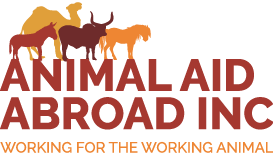Camels’ Suffering Alleviated in India
Help in Suffering is one of our partner groups in India. They run the Camel Rescue Centre (CRC) in Bassi, where the veterinary team work tirelessly to assess and treat camels or other animals in need. Recently, they had a memorable case where an owner called Nawal brought his camel into the centre after the animal had been lost in a jungle for a month. The camel was in terrible condition with his whole nasal bone and nasal passage eaten away by maggots. The CRC team cleaned the wound and killed all the maggots. They applied an antiseptic dressing and administered pain killers and antibiotics. Following regular dressing changes, the condition of this camel was much improved.
During November, the CRC treated 175 camels in total. Many camels required de-worming and the replacement of plastic nose pegs. As well as seeing camels, the team also assisted 172 other animals requiring veterinary treatment, including dogs, cows, goats, horses and monkeys.
Along with treating many animals at the CRC, Help in Suffering also attended the Pushkar Camel Fair in November. At this fair, traders and villagers all over Rajasthan gather in the ancient city of Pushkar to trade camels and other animals. This year, nearly 10,000 camels, horses and bullocks were assembled from various parts of Northern India. Help in Suffering set up a Camel Camp to provide free veterinary treatment for any ill or injured camels. Over the course of 11 days, two veterinarians and seven assistants treated 542 camels for various clinical problems.
They de-wormed 255 camels and treated hundreds of camels for gastric issues, including indigestion, diarrhoea, colic and impaction. These problems often result from sudden changes in feed and water, stress from the long journey and variations in temperature during the fair. Two hundred and seventy-five camels required treatment for mange, while another 27 camels were treated for lameness.
The team also saw many wounds in the camels, including wounds caused by nose pegs and saddles, leg injuries, eye injuries and punctured foot pads. Nose peg wounds were particularly common and, as a result, the Help in Suffering team educated every owner on the importance of using plastic nose pegs rather than wooden or metal ones. They issued 112 plastic nose pegs altogether. Additionally, 1000 educational leaflets containing information on proper care and welfare for camels were distributed to owners. As a preventative measure, the team fitted 192 reflectors onto camel carts in order to reduce the risk of road accidents occurring at night.
With support from Animal Aid Abroad, Help in Suffering are no doubt making an impact and improving the lives of working camels and other animals in this region of India.







